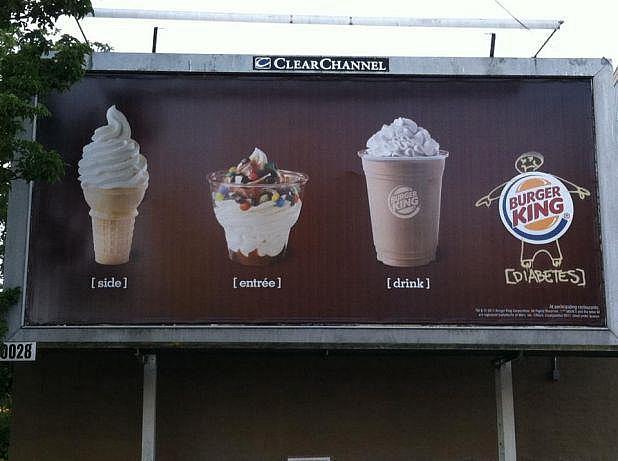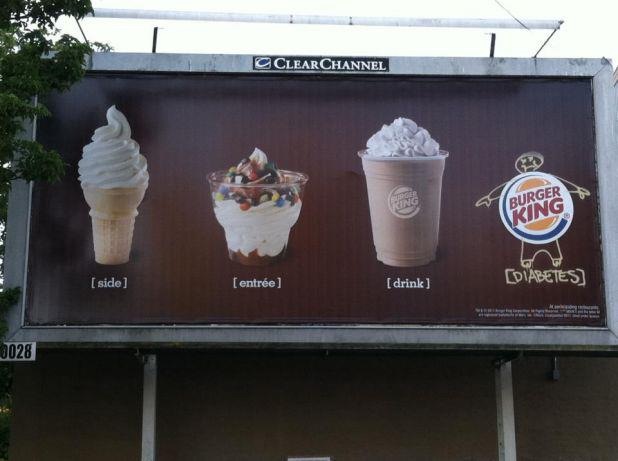Burger King: Health Hazard or Obesity Scapegoat?

 A bit of public art – OK, graffiti – got me thinking about the power of personal choices to overcome marketing messages the other day. Check out the photos to the left. Those were taken within days of each other. Clearly, someone thought that Burger King was having too much fun while marketing its desserts.
A bit of public art – OK, graffiti – got me thinking about the power of personal choices to overcome marketing messages the other day. Check out the photos to the left. Those were taken within days of each other. Clearly, someone thought that Burger King was having too much fun while marketing its desserts.
Can eating too many desserts cause diabetes? Yes.
 Is Burger King's advertising campaign to blame? That's a tougher call, one that few reporters have tried to answer.
Is Burger King's advertising campaign to blame? That's a tougher call, one that few reporters have tried to answer.
I have explored this issue in interviews with experts such as Dr. Yoni Freedhoff and Michele Simon.
"People are eating more, but it's not because of gluttony," Freedhoff told me. "It's because we are completely behind the eight ball in an environment that is completely unfair to the average person. The amount of energy and resourcefulness it takes to navigate this environment is very large."
Simon said, "It's just window dressing to say we should praise McDonald's for selling salad. McDonald's is not in the salad-making business, so why do I care? Especially when the salad still costs $6.00, and the cheeseburger is still $1.00."
How much does our obesity problem have to do with the fact that we, collectively, have little self-control over what we eat and how much does it have to do with the way bad food is promoted heavily as a cheap and easy option?
Perhaps more importantly for the ReportingonHealth community, how do we cover obesity as a disease and a risk factor for other diseases while still acknowledging that element of personal choice?
When you live in the Pacific Northwest – where people have been known to get into fist fights over what constitutes locally grown – you realize that there is a bit of snobbery in the idea that fast food chain restaurants are the main driver behind the obesity epidemic. Some of the same people who like to slag Burger King for being obesity purveyors will talk in rapturous tones about In-N-Out Burger or in the case of Seattle, where I live, Red Mill Burgers. Clearly, when it comes to fast food, there's a class line between fast food for people who can afford better and fast food for everyone else. Then there is the food that is just as bad for you but served by a waiter at restaurants with wine lists. You likely have no idea how many calories – not to mention grams of fat and sodium -- you are consuming when you're eating at some of the best restaurants in town. I plead guilty to this hypocrisy, too. I've been in heated arguments about whether the hamburgers served just a few feet from that billboard at Two Bells ($8.50) are superior to the burgers at the Palace Kitchen ($15) Still, I doubt that they contribute less to one's future heart attack. You've never heard privileged people laugh as hard as they laugh when they hear Patton Oswalt make fun of Kentucky Fried Chicken. (Again, I am guilty here and will reoffend the moment I click on this (NSFW) link. Beware that the language is not work-appropriate.)
This snobbery question was brought home to me by Nancy Shute's NPR blog post: Do People Pick Super-Sized Portions To Boost Their Social Status? She writes:
The researchers asked people to judge a person's status, based on whether he or she picked the largest coffee, smoothie, or pizza offered. The people choosing the biggest portion were judged to have the highest status.
Because many reporters – even in today's wage-slashing, job-cutting economy – are not fast food frequenters and because reporters tend to have more power than most simply by wielding the power of the pen, I ask just one thing. When writing about obesity, try to check yourself for a Burger King bias. Of course, portion sizes and nutritional content are a factor in the obesity epidemic and the rise in diabetes cases, but we may be a little too focused on the obvious, billboard-sized targets and not focused enough on the many other factors at play. I'll try to explore some of those factors in future posts.
Q&A with Dr. Yoni Freedhoff, Part 1: Taking the burden of obesity, and blame, off patients
Q&A with Dr. Yoni Freedhoff, Part 2: Challenging the orthodoxy in obesity medicine
Photo credits: Kelsey Moore (top), Peter Speyer (bottom)

